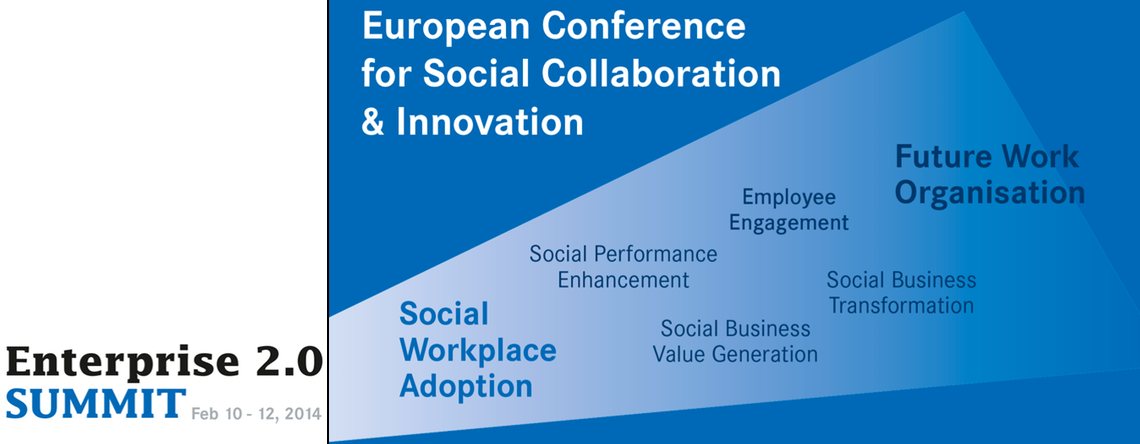 In 2014 it will be the third time the Summit is held in Paris, and it’s the foremost European gathering of experts & practitioners on new forms of communication & collaboration. However, it has been in existence since 2008. Giving its organisers plenty of experience and reputation. Which, in turn, provides us with an excellent event with great speakers and cases.
In 2014 it will be the third time the Summit is held in Paris, and it’s the foremost European gathering of experts & practitioners on new forms of communication & collaboration. However, it has been in existence since 2008. Giving its organisers plenty of experience and reputation. Which, in turn, provides us with an excellent event with great speakers and cases.
Meetups and Talks
It’s also more than just a conference. The sharing of knowledge starts way before the actual conference.
Meetups are organised in various cities across Europe, Brussels, Paris, Frankfurt and Zurich. The aim is to exchange information and discuss the upcoming conference. Various topics are covered, like the format of talks, or which case studies should make an appearance.
And besides talking, it’s a good chance to reacquaint contacts and meet new ones.
The Expert Talks are a different matter, these are carefully organised by Kongress Media, with a fixed topic and 4 to 6 experts. The discussions are interesting, to say the least. If you want to catch up with the talks, visit Kongress media’s YouTube channel.., there’s a ton of stuff there.
#e20s
Next to the pre-conference events and the conference itself, there is the hashtag #e20s. By now it’s a year round tag which signifies so much more than just the conference. It is used throughout the year in many tweets about social business, enterprise 2.0 and many other related topics.
Of course, the closer we get to the actual conference, the more the tag will appear on the Interwebs.
The Conference
You might have noticed that, lately, I talk/write a lot about the Summit. This is because I was asked to be a supporter, an ambassador of the conference. I was honoured to be asked, so, of course, I said yes.
Besides that, I attended the conference early this year, in Paris, and enjoyed it tremendously. The collective knowledge present during those 2 days was breathtaking. The people were truly social and the presentations enlightening.
So yes, I can say I’m a fan.
 Well.., the 2014 edition promises to be no less of a thrill.
Well.., the 2014 edition promises to be no less of a thrill.
Getting Social Enterprise Ready!
Late Adopters
By now, for a large part, we may assume that the necessity for social business is more or less apparent. People are starting to get it. But, a truly successful change can only be had when everybody participates. Only then can you claim the title of “Social Business”.
In very broad strokes; The first 20% is relatively easy, the next 60% will come around given time. However, the last 20% is where the true challenge lies. The 2014 edition of the Summit shall focus on the late adopters in the field.
Because so many projects get stuck in the middle, the conference aims to provide hands-on and how-to information to get unstuck, and get things moving again.
Mind you, this is not just useful for social business conversions, but can also help with many larger projects where change is at the core.
Finally, the business impact will pass the revue. After all.., we can’t make any significant change without real and measurable business results.
Master Classes
The conference is, in actuality, a three day event. On the 10th Februari Kongress Media presents no less than three Master Classes.
These will be lead by, well, masters within the field and the subjects, as they are announced at the moment are:
- Putting the Business back into Social with Bertrand Duperrin
- Defining the Internal Engagement & Community Management by Rachel Happe
- Social Business Leadership – Concepts and Practices by Dion Hinchcliffe
The keywords for the other two days, of the conference proper, are; Enabling, Engagement and Adoption
And yes.., also for this year.., there will be Lego.
Let me know if you’ll be attending too (in the comments or via Twitter), I already know some of you will.
And, let’s meet up.


 Last Friday, at an acceptable European time, I really enjoyed the first
Last Friday, at an acceptable European time, I really enjoyed the first 
 I was going through some photo’s of
I was going through some photo’s of 